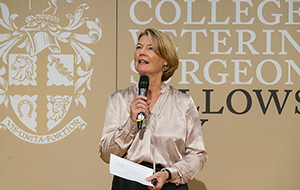-
-
- Council Members
- Role of Council Members
- Council meetings
- Council elections
- Previous election results
- Dr Louise Allum
- Dr Sam Bescoby
- Dr Andrew Clemence
- Dr Tshidi Gardiner
- Dr Reginald Godwin
- Paddy Gordon
- Dr Danielle Greenberg
- Dr Gerard Henry
- Dr Richard Hillman
- Dr Benjamin Kennedy
- Dr Tom Lonsdale
- Dr Darren Partridge
- Martin Peaty
- Alison Price
- Dr Peter Robinson
- Dr Jennifer Simmons
- Dr Sadie Spencer
- Dr Mary Thomas
- William Wilkinson
- Dr Lara Wilson
- Past-Presidents
-
-
-
-
-
- About extra-mural studies (EMS)
- EMS requirements
- Information for vet students
- Information for EMS providers
- Information for vet schools
- Temporary EMS requirements
- Practice by students - regulations
- Health and safety on EMS placements
- EMS contacts and further guidance
- Extra-mural studies fit for the future
-
-
- Code of Professional Conduct for Veterinary Surgeons
- Code of Professional Conduct for Veterinary Nurses
- Contact the Advice Team
- XL Bully dog ban
- 'Under care' - guidance
- Advice on Schedule 3
- Controlled Drugs Guidance – A to Z
- Dealing with Difficult Situations webinar recordings
- FAQs – Common medicines pitfalls
- FAQs – Routine veterinary practice and clinical veterinary research
- FAQs – Advertising of practice names
- GDPR – RCVS information and Q&As
What I've learned from the RCVS Leadership course
The Edward Jenner Leadership programme is an RCVS and NHS Leadership Academy collaboration, which principally aims to give an introduction to the art of good leadership and decision-making. The programme uses a variety of innovative ways to help participants think about and reflect on how they can grow the skills and aptitudes that underpin these two things.
The course is designed to be of benefit to everyone in the veterinary team. Demonstrating that fact, Myra Forster-van Hijfte, Fellow of the RCVS, shares her experiences of being a learner on the programme.
So why did I enrol?
First of all, I like to learn.

Secondly, during my career I have experienced both good and bad leadership and have seen the impact this has had on the people working for those leaders.
We, in the veterinary profession, have been trained as scientists and ‘problem-solvers’. We have not been trained to be leaders and most of us will get into this position by ‘accident’ and fulfill this role to the best of our ability, whilst learning from mistakes. I felt that learning more about the science behind leadership would be useful in my understanding of leadership.
Thirdly, I have been in a leadership role (note: I did not write ‘I have been a leader’) for more than 10 years and overall have found it quite a challenging role. I was therefore very interested in learning more about leadership, to reflect on my leadership career and learn how I could have done things better, as well as improve for the future.
What is the set-up of this course?
The course has been set up into modules, with relatively short multiple modules each week. You can do these at your own pace and in your own time. The learning process is very diverse with audio, video and links to articles and exercises.
After each short module there is the opportunity to share your experience and thoughts with the other people on the course and it certainly makes for very interesting reading. During the course most of us had similar remarks and responses to the course contents, but occasionally there were some left-field thoughts which made me think differently.
The course teaches you a lot of different tools. The ability to listen, to reflect on your emotions and responses to different situations in the audio scenarios and real-life experimentation, as well as teaching strategies on decision making and structured problem solving. The definition of resilience and what is needed to achieve this was also discussed.
What did I learn?
Another interesting aspect was trying to define what a 'leader' actually is and setting the distinction between management and leadership. I personally feel that, in veterinary practice, we often do not have enough time to be leaders and instead get bogged down with the day-to-day management of the veterinary practice.
I have certainly tried to be more reflective. Thinking about why I respond to certain situations the way I do, then trying to respond in a more analytical, detached way rather than in an emotional way, in order to get a better outcome for all. This is something that is difficult to do in everyday life. We are all too busy; but actually taking time to reflect and put things in perspective is very useful.
The other thing I found very useful was the way this course categorised problems into tame, critical and wicked. As veterinarians, we are problem-solvers and it was really refreshing to hear about wicked problems, which will not have an immediate easy answer.
I actually think this course is useful for any vet, even when not in a leadership role or aspiring to be a leader. And, if you are a leader, it will teach you to be more reflective and help you deal better with the people around you, as well as solve issues.
Who should do this course?
As a vet in employment, it will help you to recognise good and poor leadership and how this affects you, whilst at the same time giving you tools to improve your work environment and provide you with techniques for coping with challenges life throws at you.
I have now finished this part of the course and I've thoroughly enjoyed it. I would certainly recommend it!
Published on 30 January 2019